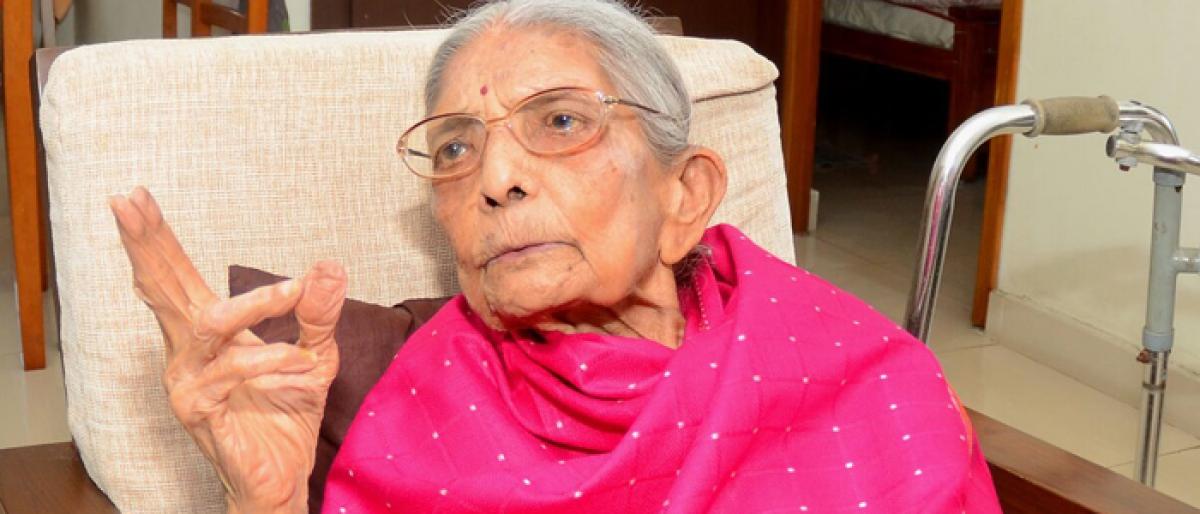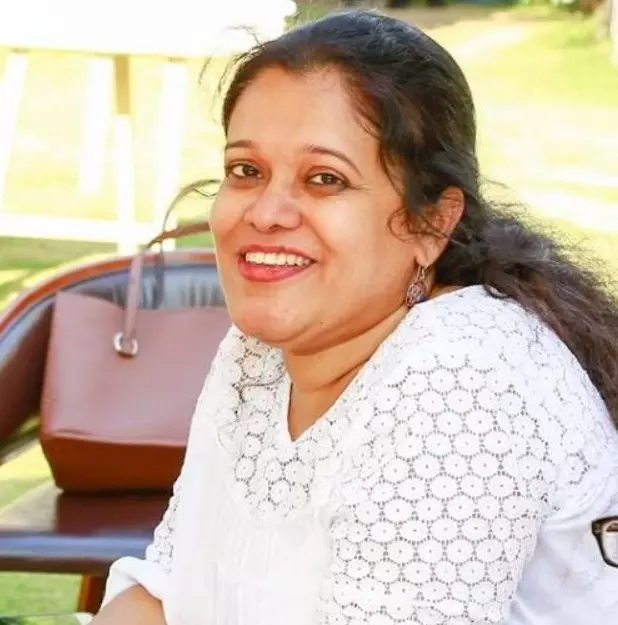Live
- Demand to set up separate ITDA for Srikakulam dist
- Drone manufacture unit inaugurated at CU
- VUPPC opposes VRS scheme
- Temple land worth `50 cr taken over by Simhachalam
- The Connection between Sleep and Women’s Health
- Youth Should Take Inspiration from Swami Vivekananda - MLA Dr. Rajesh Reddy
- Women’s Hearts Matter: Understanding the Risk and Preventing Heart Disease
- Sankranti Brahmotsavam begins at Srisailam
- Strict action against cockfights, illegal activities, SP warns
- Chittoor SP gets addl charge of Tirupati district
Just In

Women have played a pivotal role in all the movements Their histories have to be brought to light I began by writing my own, states Kondapalli Koteswaramma At the age of 92, she wrote her biography in Telugu, Nirjana Varadhi that was also translated into English and Tamil
“Women have played a pivotal role in all the movements. Their histories have to be brought to light. I began by writing my own,” states Kondapalli Koteswaramma. At the age of 92, she wrote her biography in Telugu, ‘Nirjana Varadhi’ that was also translated into English and Tamil.
As a young child, who had no idea she was married and widowed at the age of 4, she was an active student, who would be always out on stage singing songs. She refused to go to school when boys would make fun of her for singing but was attracted to nationalist movement thanks to her politically inclined uncle. “National leaders would pass our village Pamarru on the way from Vijayawada to Bandar, and because of my uncle they would make a stop and that gave me an opportunity to listen to many leaders.
I remember I garlanded Sarojini Naidu; we didn’t use flowers; the garland would be made using khadi yarn. Once I gave away my gold jewellery to Gandhiji and got an earful from my mother. We used to be taught to sing songs on King George at school – my uncle insisted we should sing patriotic songs,” shares Kondapalli Koteswaramma, who was later drawn to Communism.
She explains, “While, many youngsters left colleges and universities to follow Nationalist movement; several among them were inspired by Bhagat Singh, Chandrasekhar Azad and Sukhdev, were anguished at their hanging and incidents like Jallianwala Bagh and were drawn towards Communism.”
“Many women too were part of the movement,” she adds. It was the Communist party that initiated the wedding of Koteswaramma with Seetharamaiah, who was a passionate party worker. While they both belonged to Kamma caste, the difference in the sub-sect too was opposed. However, the party supported the couple. They were not easy times when communist leaders would get arrested, killed and tortured. She along with several other women actively supported and helped the party, and even went to jail alongside the males.
According to her, it was being part of the nationalist movement that made women aware, gave courage and strength of purpose to them, so that they could question the repressing ways of the society. And even though men did appear to be dominating to a certain extent, those within the Communist party showed some sensitivity towards women and were progressive in their ideology. They were against caste and creed.
“We were also actively involved in many women empowering reform movements. We propagated widow remarriage, inter-caste marriage, education to women. My husband wanted me to act on stage in a play that until then was only a man’s dominion. I hesitated and refused. But he did not eat food until I agreed. Many leaders convinced me that this is a very important step towards change; I was one of the forerunners in the popular Prajanatya Mandali,” she shares.
India got independence and Communist party was involved in Telangana Armed Struggle and it was volatile time with swift changes in the political sphere among which was the division of the Communist party that until then played a major role in the Nationalist movement. It was around the same time that Kondapalli Koteswarmma’s husband, popular people’s leader Seetharamaiah left home. She was left alone. Troubles became her constant companion.
Evidently, when the party divided she was heartbroken. She would continue to maintain good relations with the estranged party members. “The men would meet outside formally and speak but would ask us, women, to keep away from each other. We always found our way to meet and interact,” she relates. She had her own troubles to deal with too.
She was uneducated, didn’t have a source of income, gave away all her property to the party and she did not want to ask any one’s help. She found respite in the Durgabai Deshmukh’s Adult Education school where she enrolled and studied till 3rd form (Class VIII), before finding a job for herself at Kakinada as a hostel caretaker. While at Kakinada, she was drawn to literature, wrote poetry, essays and stories.
Life was always ready to throw a new challenge that tested Koteswaramma’s courage to face it. Her son who refused to finish his engineering study was drawn towards politics and died when he was far too young. A few years later, her daughter Dr Karuna’s husband succumbed to a strange fever, and before long Karuna too breathed her last leaving behind two young girls for her to take care. “It is the spirit of the movement that has kept me strong. It has kept me inspired and strengthened to deal with my life problems. Otherwise, I would have given up long ago,” she says.
She adds, “Youth have to be aware. They are the future. Even though, the current state of affairs is sad where a woman is unsafe, where the rapist is neither afraid of the law nor the society, where there is a resurgence of caste politics; I am an optimist. I am sure there will be strong leaders like Chandra Rajeswara Rao and Puchalapalli, who will emerge from young India and will take the country on the path of resurgence, a new India, an egalitarian society with equal opportunities minus discrimination and spite.”

© 2025 Hyderabad Media House Limited/The Hans India. All rights reserved. Powered by hocalwire.com







